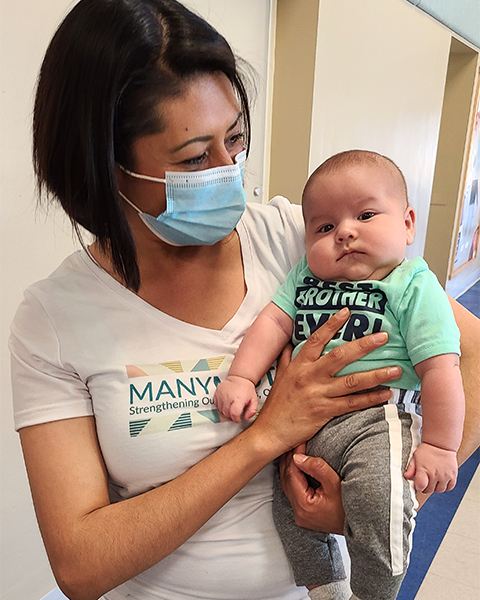Helping New Mothers at Home
April 29, 2024
Keely McDonald and her partner moved to Santa Fe from Rhode Island in August to help take care of her mother. New to the area and six months pregnant, the couple didn’t know anyone, and McDonald was desperate to find community.
She searched online and talked with locals — many were recommending the same organization. “I kept hearing Many Mothers, Many Mothers,” she says. McDonald attended a free support group for expecting mothers and caregivers run by the organization, and shortly after reached out and enrolled in their Maternal Support Home Visiting Program.
“I felt lonely as a first-time mom without family around,” she says. “I was looking for someone experienced who could help with questions, community and connection.”
The family, including their new daughter Izzy, were matched with Laura, an experienced, volunteer caregiver. For the past eight weeks, Laura has come over every Monday and Wednesday for 1.5 hours to play with their daughter Izzy, clean bottles, cook meals and take care of other needs while McDonald takes a breather or runs errands around the house.
“It’s wonderful,” she says. “She (Laura) is so helpful with the baby.”
Maternal care at home
Many Mothers’ Maternal Support Home Visiting Program provides no-cost, in-home help to new mothers and other caregivers shortly after their

baby is born to help nurture a stress-free
environment and encourage bonding between parents and infants. Their volunteer model allows Many Mothers to provide free services to families in Santa Fe, Rio Arriba and Los Alamos counties regardless of insurance and income status.
In July 2023, Blue Cross and Blue Shield of New Mexico recently awarded Many Mothers a 1-year, $20,000 grant to help fund additional time for volunteers to spend with families in need. The funding is part of BCBSNM’s Blue Impact℠ grant program, which supports organizations working to address social and economic factors that affect health and well-being.
Many Mothers Volunteers provide 12 weeks of service.
Volunteers are vetted, trained and matched with families to provide nonjudgmental assistance to new caregivers with infants up to 9 months old. Volunteers employ positive parenting strategies, provide light housekeeping, directly care for infants and support families. Each family receives 12 weeks of support — totaling at least 36 hours per child.
“There isn’t another program in the state like ours focusing on maternal healing that provides services at no cost,” says Kai Forsley, Many Mothers’ executive director. “Our volunteers are compassionate, helpful and knowledgeable, and support the mom and family as they heal.”
The Maternal Support Home Visiting Program works with community partners to provide initial and ongoing training to volunteers on breastfeeding, maternal mental health care, newborn care, child abuse and neglect, CPR and other relevant skills. Families can contact the program directly or be referred through a provider.
Between July 2023 and April 2024, the Maternal Support Home Visiting Program served 59 families and nearly 250 individual family members, surpassing the grant goal of 163 individuals.
“When new parents receive emotional and practical support after the birth of a child, it can have a significant impact on the whole family’s health,” said Latha Raja Shankar, M.D., chief medical officer at Blue Cross and Blue Shield of New Mexico. “This is especially true for parents who may need the extra help in the beginning of their journey with their first baby.”
Many Mothers started over 30 years ago to meet the emotional and physical needs of mothers after the trauma of giving birth. It has since grown to offer additional services including a program encouraging safe sleep practices, a caregiver meetup group and help with basic needs including diapers, baby food and direct financial support.
Last year, the nonprofit provided more than 3,200 hours of volunteer in-home support, $100,000-plus in infant and maternity supplies and 4,000-plus hours of case management. Most of the families that Many Mothers assists earn less than $30,000 per year.
“There’s a lot of stress and isolation that occurs after birth, and physical and emotional recovery is something we see across the board in every mother, across all income levels and demographics,” Forsley says. “Our ultimate goal is to reduce stress in the home.”
For McDonald and her new family, their caregiver Laura has done just that. They’ve saved the cost of childcare and developed a meaningful relationship that’s equipped them for long-term success.
“She (Laura) knows what’s going on in my life and I know what’s going on in hers,” McDonald says. “My daughter smiles when she comes into the room. It’s something all of us look forward to.”